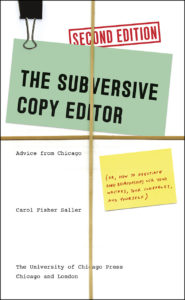Book review: The Subversive Copyeditor
 I first became aware of the work Carol Fisher Saller does when she spoke at the American Copy Editors Society conference in Portland, Oregon, and presented on her book, The Subversive Copy Editor: Advice from Chicago.
I first became aware of the work Carol Fisher Saller does when she spoke at the American Copy Editors Society conference in Portland, Oregon, and presented on her book, The Subversive Copy Editor: Advice from Chicago.
I finally read her book in January of 2018. I should have done so sooner. There are so many things we can learn from this book as translators. I am combining what I learned from her book with my own experience in the real world in this post. This post covers the highlights. I hope to give you a taste for more!
In the inside jacket, she is very straightforward about the purpose of this book. It is not for us to learn how to copy edit, but to give us some ideas as we negotiate good relationships with those we work with and ourselves. Many of the tips she gives apply to translators just as much as they do to copy editors.
Part One: Relationships with those who hire us.
Being correct about a particular turn of phrase is not worth a big argument. Instead of focusing on who is right, it is better to see what will reach the readers of the document most effectively. However, inaccuracies and inconsistencies are distracting and reflect poorly on the author. We should take care of those.
We should follow three guiding principles: carefulness, transparency, and flexibility. These remind me of the interpreting guidelines of transparency and accuracy. Interpreters convey everything that is said accurately, ask for clarifications and repetitions as needed, and are transparent so both parties know everything that is happening in the room. In the same way, as translators we should approach the text with utmost carefulness. We should also be very transparent when we make editorial decisions regarding the text by putting comments in so the requester can understand our choices. To be flexible with a translation, of course, we need to know exactly what the text is going to be used for, so it is important to ask questions.
Editing is a gift. Our translations should be edited, since most published material is edited. We should treat our editors with kindness, and learn from the comments our editor colleagues make.
Part Two: Practical issues.
Delegate or automate repetitive tasks, so we can focus on what we do best. For example, someone else might be able to set up a table in Word, check all the numbers in a set of tables, or do other repetitive chores that don’t require translation skills. That person can also check that the references are properly numbered, that the citation reference numbers match, etc. Delegating frees us up to do what we do best.
Though we may work with translation environment tools, our word processor is still our primary translation tool. It is where we do many of our final edits, write letters to clients, and do much of our work. We need to know our word processor inside and out. We should explore every feature it has, because they can help to automate certain tasks and improve our writing in many ways. Carol says having word processors and electronic tools for editing has not changed editing schedules in the last 25 years. It still takes just as long to edit a 10 page text as it did before. These tools do not make us deliver sooner. Instead, they enable us to do many things we were not able to do before, such as verifying consistency, checking for acronym use, checking double spaces, and searching for overuse of the term ‘that’.
We have to plan in order to keep our deadlines. We must organize our day, set aside distractions, set pad in our schedules, set priorities. When we have to slip a deadline, just say “something outside my control came up and I will be one day late.” It is much better to take the initiative instead of receiving an email from the client asking about it.
Sometimes we have to work quickly to meet a difficult deadline. However, that also means we will not be able to follow through with all of our quality assurance steps and we don’t produce very good quality when we are sleepy. I always let my clients know about these compromises and they are usually willing to extend the deadline or accept lower quality work knowingly. This happens in every profession. We shouldn’t make a habit of it.
We have to keep track of our income and send reminders to people who haven’t paid. In my experience, the accounting department is often missing some piece of information and they have forgotten to tell me. Other times, they had not realized the bill was due, and the check comes the next day! In all the years I have worked as a translator, I have had very few non-payers. How to sniff those out is a subject for another post.
Don’t forget to have a life away from work. Without a life, we won’t be able to give our work the best we could bring to it. We will be exhausted.
Carol Fisher Saller. The Subversive Copy Editor. Chicago: University of Chicago Press, 2009.
